Traditional home security systems were quite powerful but the only disadvantage was that they locked you into a long-term contract. You had to pay a particular fee every 2-3 years for professional monitoring services until self-monitoring systems were invented.
Roombanker offers a self-monitoring burglar alarm system that allows you to monitor your home security alarm system without contracts and monthly monitoring fees.
These self-monitored systems have the added benefit of professional monitoring, which is fantastic. So, if you feel that having a self-monitored burglar alarm system won’t be reliable enough, think again. In this guide, we will cover what are self-monitoring burglar alarm systems and how they can help you with your security concerns.
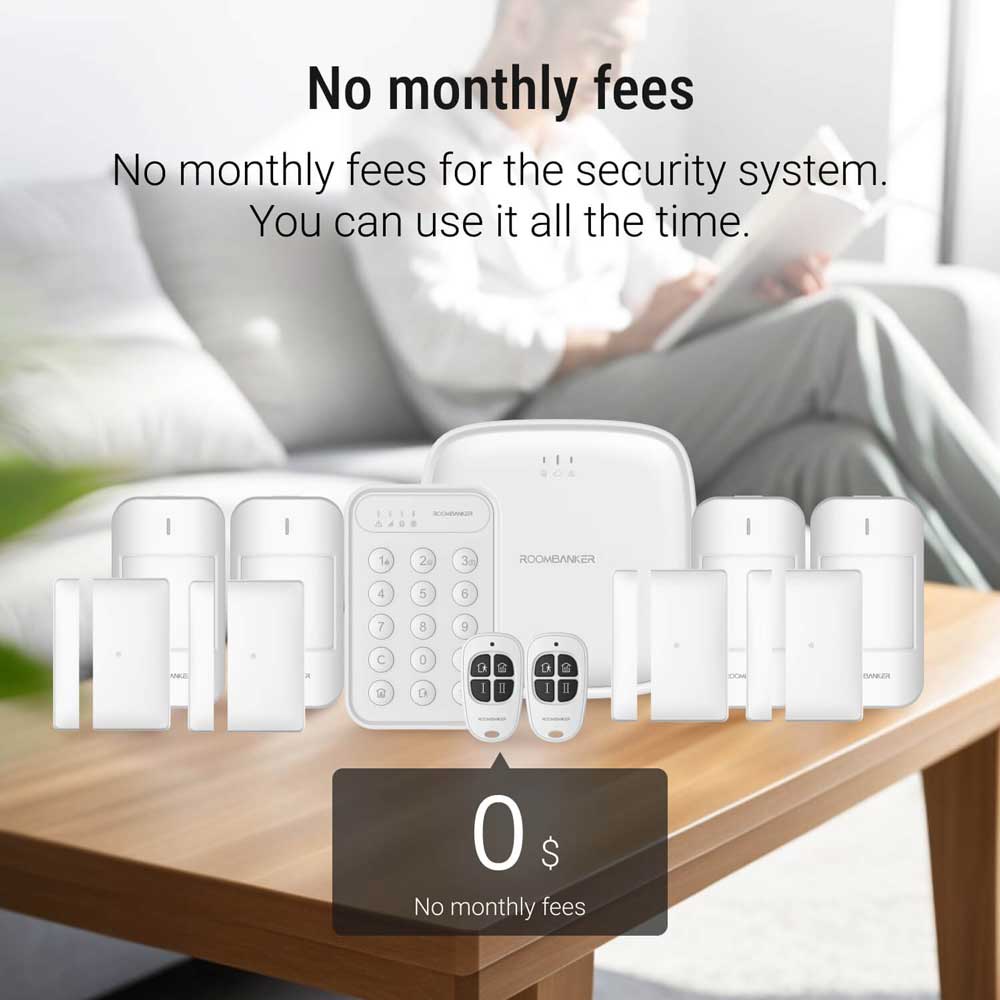
What is a Self-Monitoring Burglar Alarm System?
A self-monitored alarm system means that the homeowner can monitor their home themselves and does not need a third-party professional service company involved. In this way, you do not have to pay extra contract fees with these companies. This means reliable security solutions at affordable prices.
Self-monitoring systems often have a mobile app, some require a monthly monitoring fee for richer functions, but most of them are free to use, like that of Roombanker’s RB-Link home security app. As they do not involve third-party security service companies, they formhttps://www.roombanker.com/blog/bulk-onboarding-devices-to-the-home-security-system/ a part of the smart home system. You can easily use a smart home app to connect all devices and create a comprehensive home automation and security ecosystem.
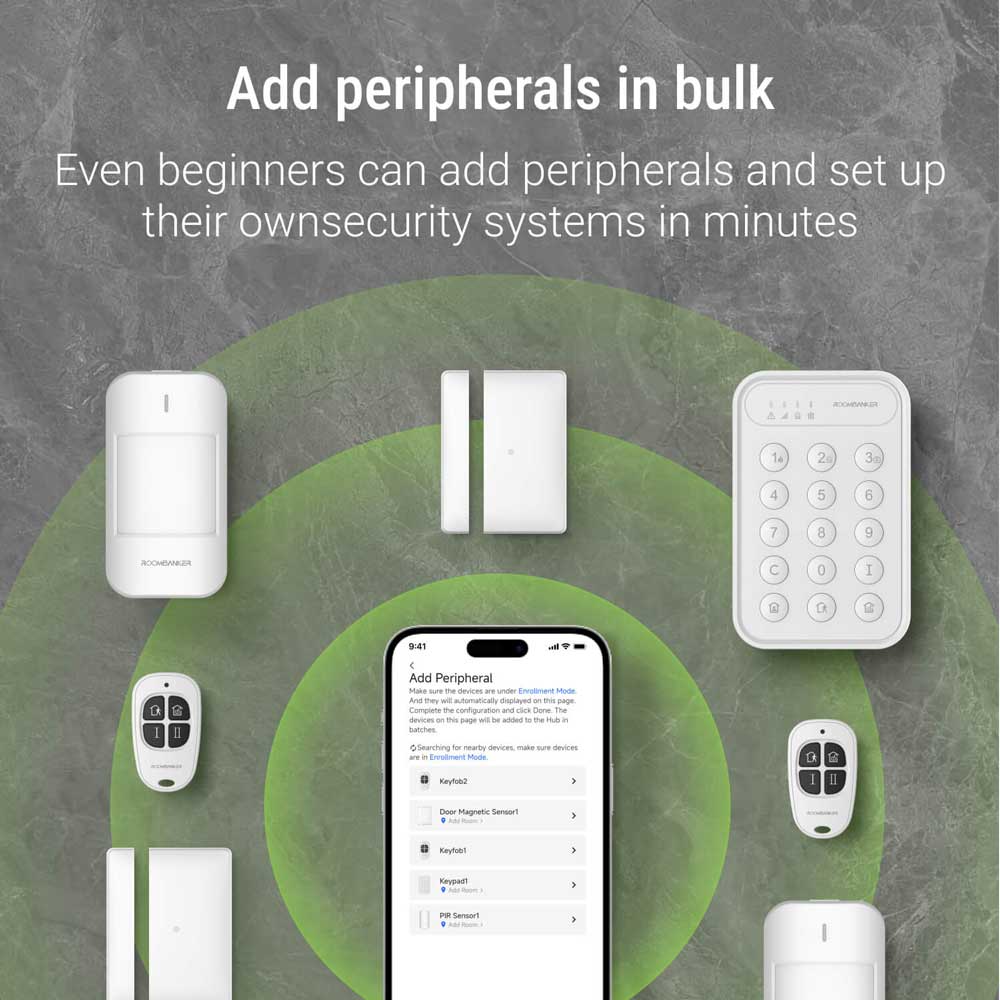
Can Self-Monitoring Burglar Alarm System Protect My Home?
To answer your question about whether a self-monitoring system can protect your home, yes it can. It adds an additional security defense layer, with lower cost. All security systems have their pros and cons but rest assured, you can easily monitor your house without paying for a lot of contract fees and getting bound by service providers.
Self-monitored security systems provide you with freedom and control. Additionally, It can be designed with professional device features and let you enjoy same the standards. All you need to do is use the mobile app to set it up and monitor your house. However, finding the system with the appropriate device kits, options of monthly monitoring fees, and extra features to match your budget may be the tricky part.
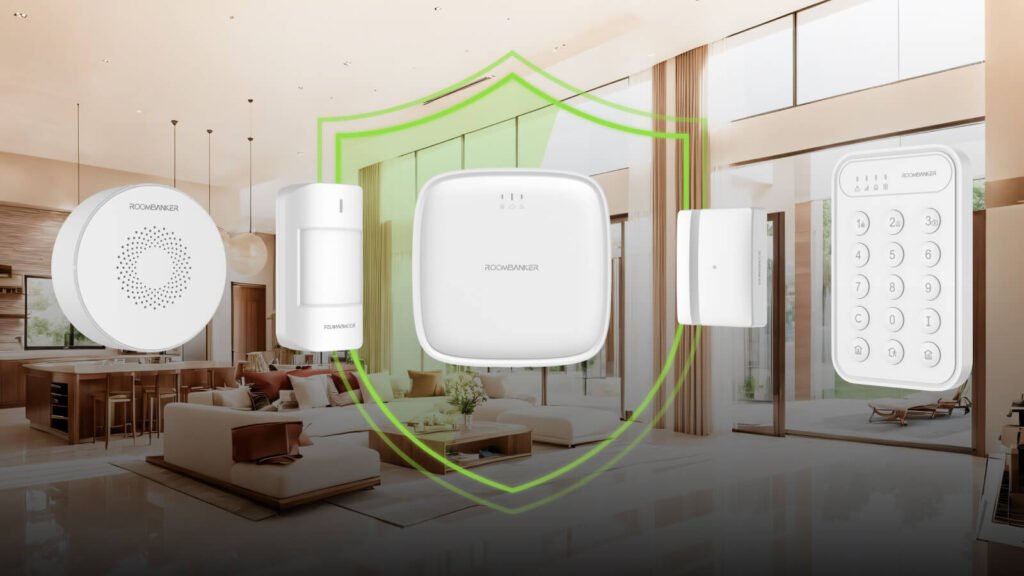
How Does Self-Monitoring Burglar Alarm System Work?
Having an alarm system that self-monitors gives you full ownership over the safety of your property. This is how it functions:
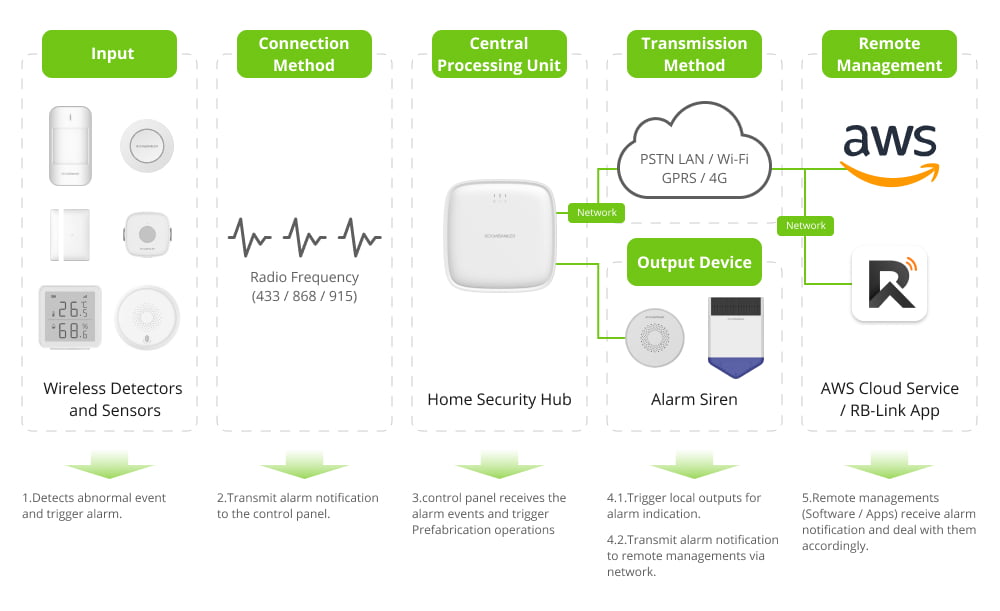
- DIY Installation: Homeowners install the self-monitoring home security kits themselves without the help of a professional. This typically requires the devices of self-monitoring systems to be easy-to-install-and-setup. It should often be finished during 30 minutes, otherwise it may make users feel frustrated and lose confidence.
- Direct Alerts: Your mobile phone or any designated device like sirens will receive alerts straight from the system in the case of suspicious activity. Alarm sirens that can be installed indoor or outdoor will receive alerts straight from the system and will sound louder to deter burglars.
- Remote Control: You can arm or disarm the security system, monitor its status, and even see live feeds from security systems from anywhere in the world using a specialized home security system app.
- Control Panel: Self-monitoring systems often have a local home alarm control panel such as alarm keypad or key fob for security system, and a base station like smart Home Security Hub for remote message sending. The alarm system can be handled with the control panel.
- Alerts and Notifications: When a sensor is triggered, such as a PIR motion detector detecting movement or a magnetic door sensor detecting a breach, the system sends an alert to the homeowner’s smartphone via SMS, phone call or app notification.
How to Make Sure Self-monitoring Burglar Alarm Systems Always Work Effectively?
- Enable mobile phone app notifications, phone calls, and SMS updates to receive timely information and alerts regarding the system’s status and any potential issues.
- Since there is no involvement of a third party, it is advisable to periodically check the system yourself to ensure its proper functioning and address any issues promptly.
- Install the monitoring devices in visible locations, prominently displaying them to serve as a deterrent to potential burglars, conveying that your home is well-protected.
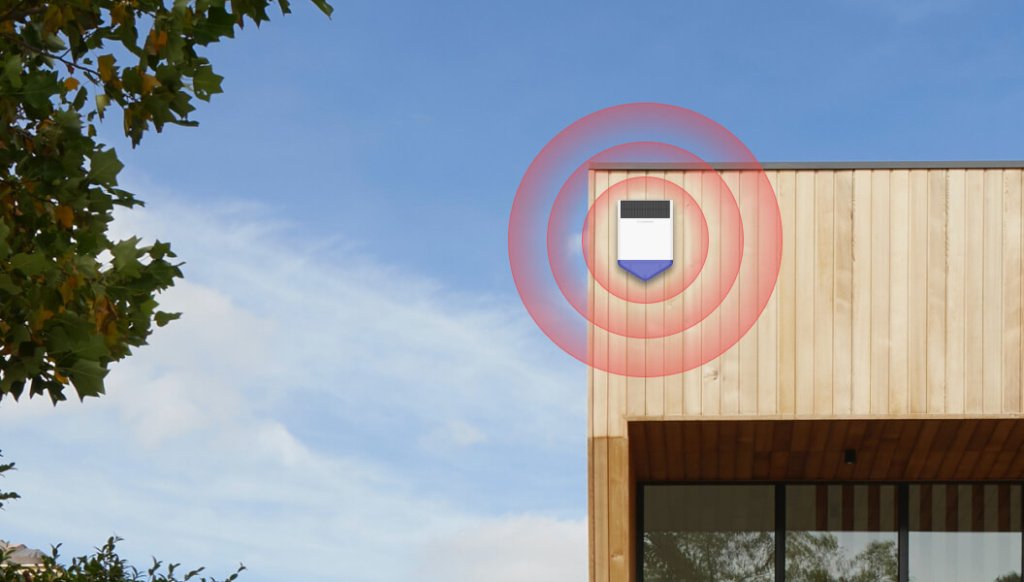
Pros and Cons of Using a Self-monitoring Burglar Alarm System
Some homeowners prefer the privacy offered by self-monitoring systems, as they do not involve third-party monitoring services. As with any security system, there are pros and cons of using a self-monitoring burglar alarm system. Now, the pros and cons of this system will also depend on your needs and the location of your house. Let’s take a look at it.
| Pros | Cons |
| Cuts down on your monthly fees that you would otherwise have to pay to service providers | The user must be available to monitor it and take proper action |
| Offers self-monitoring for better home privacy | might be less effective than the professional type that authorities are involved |
| Often integrates with smart home systems for automated control | Some may worry about the compatibility with smart home system |
| Easy to install, flexible configurations, and no middlemen required | Some may worry about the reliability of self-installation |
| Instant alerts prompt instant action | |
| Affordable solution |
What to Look For in a No-Fee Self-monitoring Security Alarm System?
Before you go for an impromptu shopping spree for your no-fee security system, make sure that you consider these factors for informed decision-making.
- Ease of Installation: Choose a provider who doesn’t overcomplicate things because the majority of no-monthly-fee alarm systems require DIY installation. Since it’s going to be DIY, you can save a few bucks there as well.
- Device Quality: You want to buy an alarm that is durable and can work for many years. This depends on the device’s quality and battery life. Look for a reliable device provider that offers warranty and after-sales service for a better user experience.
- Variety of Equipment: Find suppliers that offer a variety of security devices so that it’s easy to install in various locations, such as apartments, and big or medium houses. Roombanker offers various devices that allow you to freely schedule your system as you like.
- Equipment bundles: A lot of home security businesses provide security equipment bundles, which may make feel you have to go through a lot of processes. They should consider customizing your package.
- Reputation: Verify that the security alarm supplier has a solid track record of offering dependable, high-quality equipment along with excellent customer support. You can check customer reviews to make sure that you’re selecting the right equipment for your needs.
- Cost: Make sure that you pay for the worth of the product. It is not always wise to invest in a costly security system that has unnecessary features. You can compare device prices without considering complicated subscription plans. This will be much easier, and you can pick up the most appropriate one even faster.
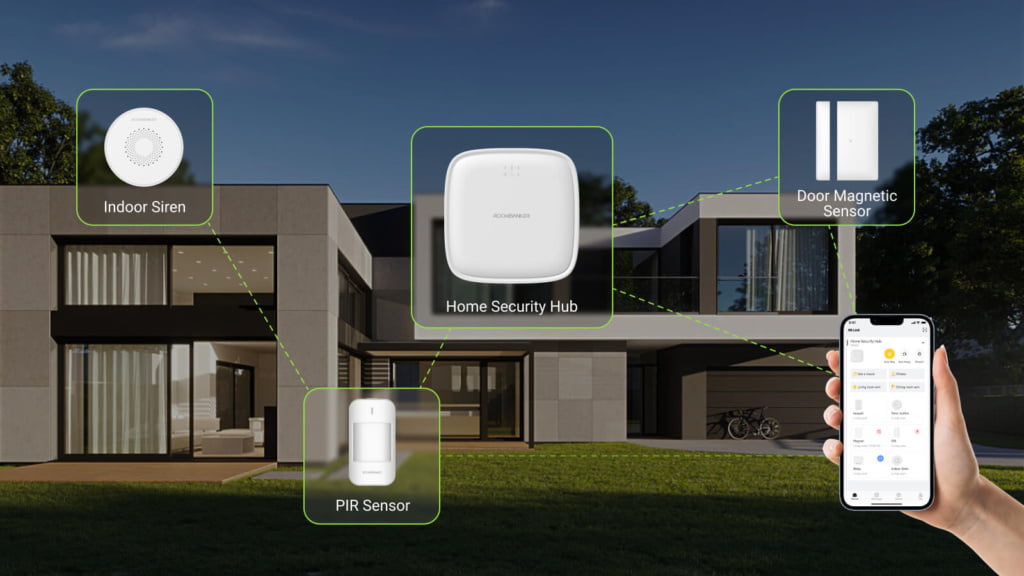
Self Monitoring with Roombanker Home Security Kits
If you are a renter or own an apartment house, it’s a good idea to invest in a self-monitoring burglar alarm system. This will help you reduce costs without being tied to a long-term contract with your security service provider. Roombankers offers multiple security devices without asking for any monthly fees. So, make sure to explore the website for new technology security systems.
Roombanker wireless security alarm system is totally self-monitoring, and maybe one day it will also introduce monthly-monitoring-fee modes. But do not hesitate to buy it when it still does not charge monthly fees. Also, we are recruiting alarm distributors and partners worldwide, who have the freedom to charge monthly fees.
FAQs
Is Professional Monitoring and Subscription Plans Worth It?
There is no right or wrong response to this question because risk tolerance varies widely among people. Sure, having a professionally monitored system will increase your security and peace of mind, but you may just as well protect your family and property with a self-monitored, subscription-free system.
We would advise beginning with a system that doesn’t require any additional expenses. After installing every piece of equipment, allow it a few weeks to settle in and see how it works. If you think that you’re missing out on a few features because you’ve not subscribed to the monthly plan, you can sign up to see how that works for you.
After that, if you still think you need it, you can enroll in private monitoring. There’s no reason not to proceed cautiously at first.
What Are Different Modes of Communication with a Self-Monitored Burglar Alarm?
The self-monitored alarm system uses different modes of communication based on the model you use.
To ensure that alert information reaches the relevant individuals instantly, even if one communication line is compromised by burglars, so they can take immediate action to address the situation.
1. PSTN Connection
The self-monitored alarm system connects to your smartphone via your house landline. At least three of your preferred numbers are contacted by all intercommunicating alarms when they detect suspicious activity. Additionally, the alarm will call you on the landline when it goes off. The system will only use your PSTN connection once it shuts off.
2. GSM Connection
A self-monitored security system can also use a SIM card to run. When the alarm goes off, this system takes advantage of a wireless connection to give you a call and text you an alert. The control panel’s location gives you more options. This is due to the fact that the panel alone requires a power source. Additionally, you may set up the GSM device to text you with notifications for different alarm events, like tampering, power outages, or accessory issues.
3. IP Connection
The self-monitored alarm system has the ability to connect to cloud services via the IP network using broadband routers. You can use a network cable or a separate wireless connector module to establish the connection. We advise you to place the control panel close to the router and install a keypad close to the front entrance to connect the router to the cables.
4. Wi-Fi Connection
Certain alarm systems connect wirelessly to your internet connection for Wi-Fi. As a result, running networking wires and positioning the control panel adjacent to the broadband router are no longer necessary. To use this feature, you would want an extremely reliable broadband connection. A fiber connection option would be ideal, and if at all possible, a static IP address.
